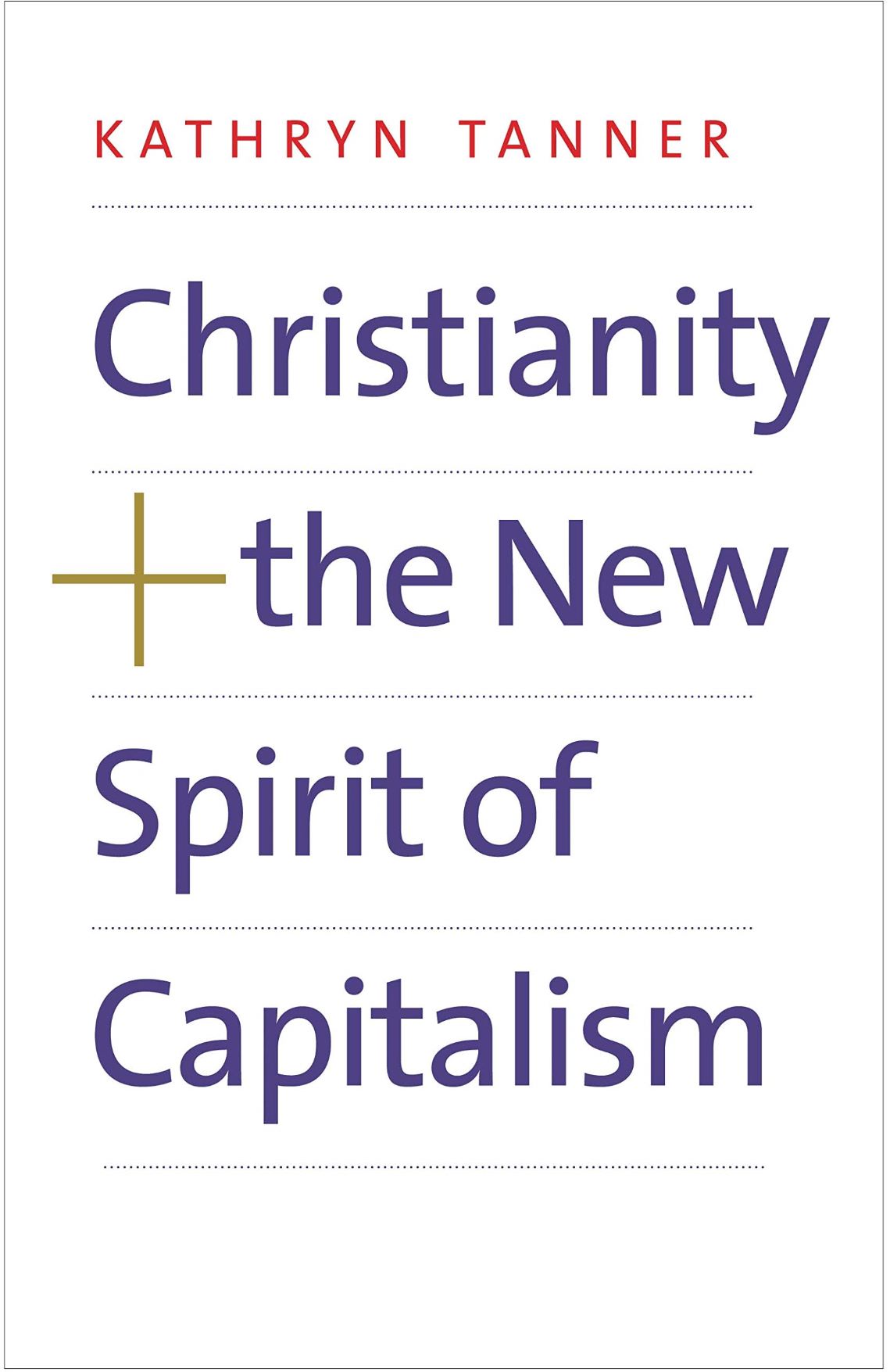
Christianity and the New Spirit of Capitalism is, in one sense, inspired by Max Weber’s famous suggestion that Protestant Christian beliefs gave rise to a work ethic that provided the foundation of modern capitalism. Weber believed that the Protestant ethic produced what he called the “Spirit of Capitalism” and Kathryn Tanner agrees that “religious beliefs (Christian beliefs specifically) have the capacity to provide powerful psychological sanctions for economic behavior” (page 4). She also adopts the concept of the “Spirit of Capitalism” but her aim is far removed from that of Weber: she seeks “to show how Christian beliefs … might undermine rather than support the new spirit of capitalism” (page 7).
Tanner’s thesis is that capitalism is now finance-dominated and has cultural commitments that are at odds with Christianity. She thus wants “to provide a Protestant anti-work ethic” (page 30). With this objective in mind, each chapter of her book (other than the first) comprises a description of an aspect of what Tanner considers to be the spirit of “finance-dominated capitalism” followed by a contrasting description of what she considers to be the relevant Christian philosophy. She concludes by expressing the hope that she has “shown the coherence of a whole new world to be entertained as an imaginative counter to the whole world of capitalism as it presently exists” (page 219).
A number of Tanner’s criticisms of the extremes of some forms of capitalism would be widely accepted. For example, she criticises the demand for total commitment to paid work that leaves no time for reflection, the maximising of profit at the expense of everything else, the regarding of people as mere economic property, short termism in management and the devastating social consequences of personal debt among the poor. Furthermore, many Christians and other theists will agree with her starting point in relation to commitment, identity and value: “Commitment to God and the conversion that brings it about interfere with total commitment to anything else, thereby limiting the degree to which I could ever be completely personally invested in a company’s aims” (page 86); “the tasks one undertakes at work cannot be taken to exhaust one’s identity – and should not be pursued in any all-consuming fashion that would suggest as much” (page 98); and “What matters in the end is one’s relation with God, one’s value in God’s eyes and not one’s relative worth measured against others” (page 204). Put simply, capitalism cannot be accepted as an all embracing world view.
That said, however, Tanner’s thesis does not hold together. She states that her accounts of finance-dominated capitalism and its spirit “are offered as ideal types in a Weberian sense of that phrase: that is, they are analytical constructs that accentuate certain aspects of the messy reality of the current economic and cultural scene and show how they might be brought together into relationships with an internal consistency” (page 10). However, what she offers is a muddled caricature.
She fails to distinguish between situations that are fundamentally different: comments that could only relate to investment banks are mixed in with comments that appear to relate to industrial companies without the distinction being acknowledged; she fails to distinguish between the activities and motives of market-makers and other dealers, those of corporate users of the financial markets and those of long-term investors; and comments relating to people fail to identify the exact groups to which they relate, with the result that the problems faced by professionals, other white collar workers, skilled and unskilled workers are jumbled together as though they represented problems common to the mass of humanity exposed to modern capitalism.
Many of Tanner’s statements are absurdly extreme. She makes modern corporations sound like Maoist states, commenting that “Workers themselves are to want nothing more than what corporations ask of them; their own desires are to be brought into complete compliance with finance-dominated corporate interests” (page 64) and “Workers are to be encouraged to want for themselves what the company wants from them” (page 70). It seems that corporations can do nothing right in her eyes: she laments the pushing down of responsibility for decision making, continual assessment, the use of relative rather than absolute measures of performance, the need for workers to perform increasingly complex tasks and even multi-skilling!
Her criticisms of the financial markets are similarly exaggerated. She recognises that derivatives may be a form of insurance and, on occasions, makes comments that suggest that she may have an inkling that the reality is more complex than her thesis suggests. However, she spends many pages asserting, essentially, that the financial markets are divorced from underlying economic reality and that they offer “promises of a defanged future” that “turn out to be spurious” (page 156).
Tanner is also critical of governments suggesting that they too have become finance-dominated and are reneging on “previously accepted obligations to guarantee the welfare of the population, through medical or unemployment benefits, for instance” (page 22). However, the bogeymen in relation to this are clear: she says that “government policy can easily be taken hostage by foreign investors and the increasingly few rich among its own citizens with the ability to make significant purchases of government bonds” (page 23). Absurdly, she asserts that “Only efficiently run governments, which means governments run like finance-dominated corporations so as to cut costs to the bone, are deemed credit-worthy on the open market” (page 48). If this were true then the majority of governments around the world would find it impossible to secure finance!
Many Christians will take issue with Tanner’s theology. Some aspects of this are peripheral to her thesis. However, her theology of work is central to that thesis and is highly contentious. She asserts that “there is surprisingly little reason to think Christianity has a direct interest in developing a work ethic at all” (page 198) and she rejects the idea of secular vocation (i.e. the view that “one can serve God directly in economic pursuits because those are thought to be themselves divine vocations, part of God’s specific plans for one’s life”, page 200). Unfortunately, once again, she caricatures the view that she is criticising and never engages properly with the arguments in its favour. She asserts that “The problem with direct assignment of religious value to economic pursuits is that it provides religious sanction for whatever form of employment society happens to saddle one with, no matter how limiting or degrading” (page 201), which is blatantly untrue of most forms of the Protestant work ethic. She then justifies her “anti-work ethic” on the basis that one’s individual worth comes from God and not from comparison with other people, which is true but beside the point.
She never engages with the statements of Jesus and St. Paul and other biblical writers that appear to ascribe real value to secular work (e.g. “Whatever you do, work at it with all your heart, as working for the Lord, not human masters”, Colossians 3:23, NIV). She also asserts that “God…does not create and save people for the sake of some objective they are tasked with pursuing” (page 206) without engaging properly with parts of the Bible that appear to assert that part of the objective of creation and redemption is productive work. She says that “there was no need for extreme effort in Eden before the disordering of the world as God intended it” (page 207) and appears to believe that she has thereby demonstrated that those who appeal to the Genesis account in support of the Protestant work ethic are wrong. However, the inclusion of the word “extreme” results in her attacking an Aunt Sally. She does not deal with the fact that the Bible indicates that, prior to the Fall, God intended people to work (Genesis 2:16) or the fact that we live in a fallen world.
Even those who accept Tanner’s basic thesis are likely to find the book unsatisfactory since it lacks suggestions as to what Christians should do about the mismatch between the spirit of modern capitalism and that of Christianity. Bizarrely, the only specific practical suggestion in the whole book is that employers should make “no-interest advances on worker’s paychecks in a routine fashion … rather than leaving them with high-interest payday loans as their only option” (page 128), a suggestion that misses the point that such advances would simply bring forward the monthly payday without solving the financial problems of employees that result in the recourse to payday debt.
Tanner may object that her purpose is merely to encourage Christians (and, perhaps, others) to adopt an ethic that it is at odds with what she perceives to be the spirit of modern capitalism. She says that she is suggesting “that the financial approach to the future is part of the present world to be left behind, a world to be repudiated in all the very basic ways it counsels people to relate to themselves and others, in favour of a whole new world to come that will be as different from this world as possible” (page 166). This is fine sounding but it is hard to see how it will help anyone decide how to behave in relation to their everyday work. If one accepts her rejection of the view that secular work can be a calling, one has to determine the role that it should play in one’s life and the relationship between it and other aspects of life. Furthermore, if one wishes to have an influence on companies and governments, then one needs to have some specific policy suggestions to offer.
Those looking for help in relation to these things would be better off reading some of the other books reviewed in the section of this website entitled “The Business World” (see, in particular, those mentioned under “The Purpose of Business”).
“Christianity and the New Spirit of Capitalism” by Kathryn Tanner was published in 2019 by Yale University Press (ISBN 9780300219036). 219pp, plus notes.
 Richard Godden is a Lawyer and has been a Partner with Linklaters for over 25 years during which time he has advised on a wide range of transactions and issues in various parts of the world.
Richard Godden is a Lawyer and has been a Partner with Linklaters for over 25 years during which time he has advised on a wide range of transactions and issues in various parts of the world.
Richard’s experience includes his time as Secretary at the UK Takeover Panel and a secondment to Linklaters’ Hong Kong office. He also served as Global Head of Client Sectors, responsible for Linklaters’ industry sector groups, and was a member of the Global Executive Committee.